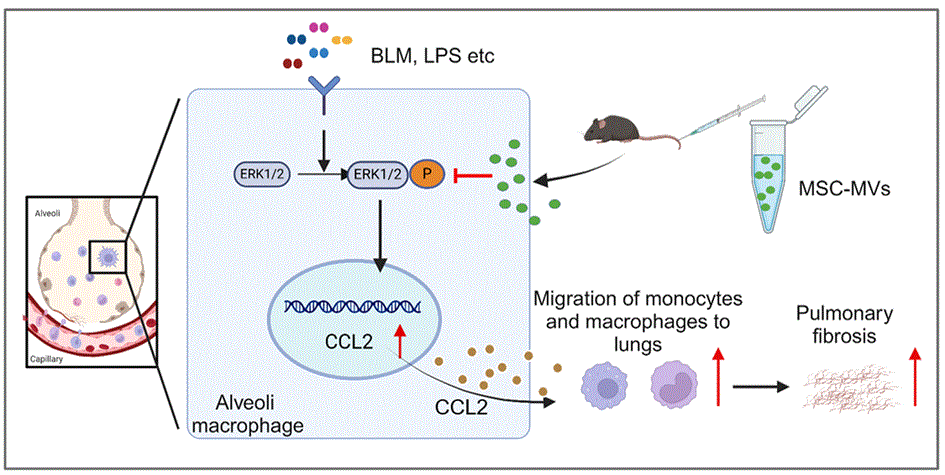Session Information
Session Type: Poster Session C
Session Time: 10:30AM-12:30PM
Background/Purpose: Pulmonary fibrosis (PF) is a disease with high morbidity and mortality rates, but effective treatment options extremely limited. Mesenchymal stem cells (MSCs) and their derivatives hold great promise as potential therapeutic strategies for PF. However, the underlying mechanisms responsible for these beneficial effects remain poorly understood. The objective of this study was to elucidate the specific mechanism through which microvesicles derived from human umbilical cord mesenchymal stem cells (MSC-MVs) alleviate PF.
Methods: The effects of MSC-MVs for PF of bleomycin (BLM)-induced mice were assessed using histological staining techniques, flow cytometry, and enzyme-linked immunosorbent assay (ELISA). The potential therapeutic target was identified by RNA-seq analysis, following validated using real-time quantitative polymerase chain reaction (RT-qPCR), ELISA, scratch testing, and Western blotting (WB).
Results: MSC-MVs significantly attenuated collagen fiber deposition and downregulated the expression of extracellular matrix components in the lungs of BLM-induced mice. Simultaneously, they markedly ameliorated lung inflammation by reducing monocyte-macrophage and the levels of TNF-α and IL-6. Further investigations revealed MSC-MVs inhibited the classical chemotactic CCL2/CCR2 axis of monocyte-macrophages, leading to reduced recruitment of monocytes-macrophages to the lungs, thereby diminishing lung inflammation and preventing fibrosis progression. Both in vitro and in vivo findings demonstrated that MSC-MVs suppressed ERK1/2 phosphorylation followed by decreased CCL2 production to modulate monocyte–macrophage migration.
Conclusion: Our findings provide evidence that the protective effect of MSC-MVs against BLM-induced lung toxicity was achieved through the inhibition of the ERK1/2 signaling pathway, leading to the suppression of CCL2 expression and subsequent modulation of monocyte-macrophage migration, thereby establishing a theoretical basis for understanding the role of MSC-MVs in pulmonary fibrosis.
To cite this abstract in AMA style:
Liang X. Human Umbilical Cord Mesenchymal Stem Cell-derived Microvesicles Alleviate Pulmonary Fibrosis by Inhibiting Monocyte-macrophage Migration Through ERK1/2 Signaling-mediated Suppression of CCL2 Expression [abstract]. Arthritis Rheumatol. 2024; 76 (suppl 9). https://acrabstracts.org/abstract/human-umbilical-cord-mesenchymal-stem-cell-derived-microvesicles-alleviate-pulmonary-fibrosis-by-inhibiting-monocyte-macrophage-migration-through-erk1-2-signaling-mediated-suppression-of-ccl2-expressi/. Accessed .« Back to ACR Convergence 2024
ACR Meeting Abstracts - https://acrabstracts.org/abstract/human-umbilical-cord-mesenchymal-stem-cell-derived-microvesicles-alleviate-pulmonary-fibrosis-by-inhibiting-monocyte-macrophage-migration-through-erk1-2-signaling-mediated-suppression-of-ccl2-expressi/

